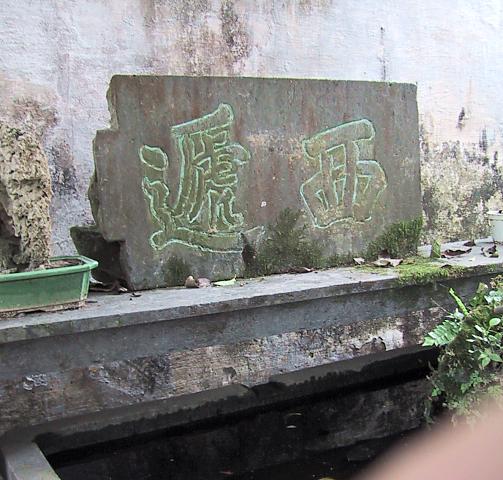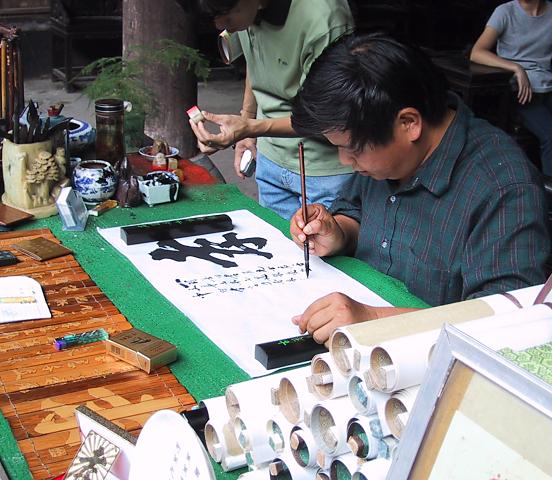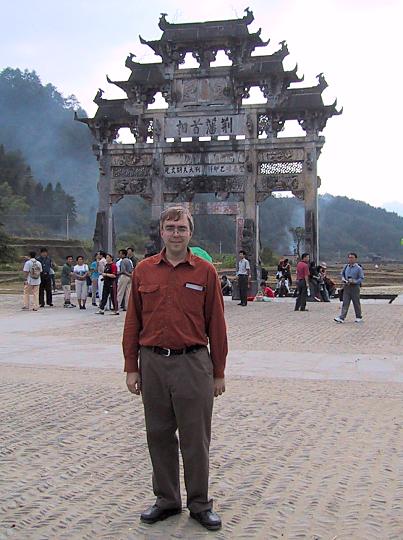
We arrived on a sleeper train at about 3AM in Tunxi. We had a reservation
at a hotel there but the taxi driver had never heard of it. After driving
around and asking people on the street, we gave up and asked him to drive
us to to the base of the mountain. At about 5AM we arrived in Tangkou. We
checked into the only hotel that looked open and tried to sleep. Unfortunately,
the town woke up about 10 minutes later and so did we.

An old street in Tangkou. This street was great! On the first night here
we walked up this street and I left my camera behind because it was dark.
That was a major mistake! I brought the camera back the next day but was
unable to recreate some of the scenes from the previous night which included
Monks playing pool on an outdoor pool table and two women serenading Maggie
and me with traditional opera at our outdoor dinner table! The restaurant
that we ate at only had about 4 tables but there were still about 80 items
on the menu. The owners decided that I was in my 30s and was a student of
Chinese language at Shanghai University. Maggie told them that they were
correct!

Under the bridge....

And then shots from the bridge.

There were many interesting things for sale such as bottles of wine with
nasty-looking snakes inside. (Chinese wine is about 50% alcohol - very
potent.)

The town has nice views in every direction.

Tea growing on the side of a hill. We booked a guided tour of two old towns
and around this spot, the tour guide announced that we would have to go to
the police station to get permission for me to enter. (I'm glad I had Maggie
to translate. I would have wondered what I had done wrong.)

I got an alien travel permit to enter the two towns. At the time I had no
idea why I needed this but when I got back I read that there was a missile
base nearby so perhaps that explains it.

This area has history going back to about 200 BC. Because it was difficult to get to (in the past access was via a cave), it was largely cut off from modernization.
Entering the old town.


A school

A classroom

For security, the homes built at this time had windows (openings) only in
the roofs. When it rains, you just don't stand under the windows.

The place for students to pay respect to Confucius

Crouching Tiger/ Hidden Dragon was filmed here. The characters
leaped/ran/floated across this pool in the movie.



Hongcun is laid out in the shape of an ox with a pair of 400 year-old trees
serving as the horns. In the 1300s there were many fires so a fung shui master
was called in. He suggested giving the ox a digestive system of canals and
pools to clean out the flammable spirits. As a result, every home here has
water flowing by it. The rule was (and is) that it was for drinking before
9AM and other uses after 9AM.

Here's one of the after 9AM uses. While this is an old town and a tourist
attraction, it is also a normal functioning town with real residents.

I snuck up on Maggie again. Maggie prefers photos to be more formal but I
like some unposed shots as well.

Rice

A large rice grinder

Maggie demonstrates another rice grinder.

I like these long narrow alleys.

One of the town's residents watches the tourists go by.

Back outside the town.

The eldest son of the last Tang emperor came here in 904AD after the fall of Tang dynasty and founded the Hy clan which is now the largest in the town. The merchants of this town were quite wealthy and donated generously to the Imperial government. The emperor returned the favor by bestowing many titles on them.
The Governor's Arch was commissioned by Emperor Shenzong of the Ming dynasty
to honor a resident who served the Ming court. It features 16 lions and 6
crocodiles.

At first I was surprised that the clock was running and keeping the right
time. I had forgotten that people are still living in these homes. It must
be strange to have your home open to the public.

Maggie asked why I took this picture. I answered that I liked the mix of
the old and the new. People still live in this city so you see color photos
and a plastic toilet brush hanging on an old carved wall. The owner was behind
me and I don't think he understood why I thought this was interesting
either.


This says Xi Di - the name of the town and is a historical landmark.

Some nicely carved windows!


I closeup on a piece of old furniture.


The Hall of Respect.

Here is another resident at work.

Paintings like these are found in many of the homes.

The Emperor Tang Tai Zong of the Tang dynasty. He was the ancestor of the
people in this town

Here is a big jar under one of the windows. The people thought that good
things would be given by god through the window, so they put this jar there
to receive them.

Making myself at home.

Another relaxed resident.


On the way back out.

I snuck this photo on the bus from Tangkou to Tunxi

Out the bus window

Back in Tunxi we saw some people washing clothes...

and food...

near the city's old town. I bought a teapot and we ate dinner near here.

We took a three-wheeled pedal vehicle (the modern rickshaw) back to the hotel.
The ride was a little bouncy :-)

Tunxi at night. The object in the middle is the same kind of pedalled vehicle.
We road for about 20 minute for 8 yuan (less than 1 USD.)
